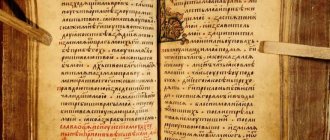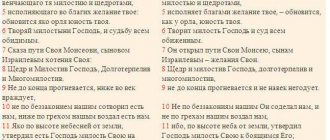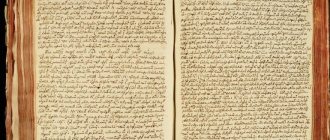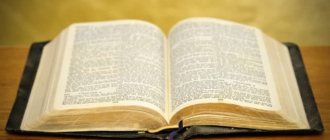The authorship of the 25th Psalm undoubtedly belongs to David, since the narration in the text comes from the first person, indicating events that correlate with those that occurred at a certain moment in the king’s life. From the song the reader understands that during the period of its composition nothing prevented the prophet from calmly visiting the tabernacle and bringing gifts to the Lord.
This indicates that this work is not connected with the author’s conflict with Saul, with his exile, or wanderings in the desert. However, David's heart is filled with sadness. He was driven into despair by his own son, who betrayed his father and spread rumors throughout the land of the Jewish people that the great anointed of God could no longer occupy the throne.
Text of Psalm 25
For personal prayer at home, many believers use the text in Russian. There are several translations, the meaning of these songs is the same. Those who are prepared and know how to read Church Slavonic are recommended to read the traditional song performed within the walls of the temple during the service.
In Church Slavonic with accents
In Russian
Psalm 25 - text of the prayer in Russian, interpretation, why it is read
The Psalter is one of the most popular books of the Bible, probably because it contains many useful stories. Every believer has encountered injustice in his life. How should someone who calls himself a Christian approach it? This can be learned by carefully analyzing Psalm 25. The Bible provides an example of how to behave in times of persecution and attack.
Text of Psalm 25
| Psalm to David | Psalm of David. |
| 1 Judge me, O Lord, that I have walked in kindness, and trusted in the Lord, and have not fainted. | 1 Judge me, O Lord, for I have walked in goodness, and trusting in the Lord, I will not faint. |
| 2 Tempt me, O Lord, and try me, kindle my bowels and my heart. | 2 Test me, O Lord, and try me, melt my bowels and my heart. |
| 3 For Thy mercy is before my eyes, and I am well pleased in Thy truth. | 3 For Your mercy is before my eyes, and I have been well pleased with You in Your truth. |
| 4 I did not ride with a vain company, nor with the transgressors. | 4 I have not sat in the council of vanity, neither will I go with the transgressors, |
| 5 I hate the church of the wicked, and will not sit with the wicked. | 5 I have hated the assembly of evildoers, and will not sit with the wicked. |
| 6 I will wash my innocent hands, and will build up your altar, O Lord. | 6 I will wash my hands among the innocent and will circumambulate Your altar, O Lord. |
| 7 Let me hear the voice of Your praise, and tell me all Your wonders. | 7 that I may hear the voice of Your praise and tell me of all Your wonders. |
| 8 Lord, I have loved the beauty of Your house and the dwelling place of Your glory. | 8 Lord, I have loved the splendor of Your house and the dwelling place of Your glory. |
| 9 Let me not destroy my soul with the wicked, or my belly with the blood of men. | 9 Do not destroy my soul with the wicked, nor my life with the bloodthirsty, |
| 10 In the hand of iniquity, their right hand is filled with reward. | 10 who have iniquity in their hands, their right hand is full of unrighteous reward. |
| 11 But I have walked through my kindness, deliver me, O Lord, and have mercy on me. | 11 But I walked in my goodness; deliver me, O Lord, and have mercy on me. |
| 12 My foot is in righteousness: in the churches I will bless Thee, O Lord. | 12 My foot is on the straight path; in the meetings I will bless You, O Lord. |
Authorship and interpretation of Psalm 25
The writer of these lines, according to the majority of the holy fathers, was David. Many researchers believe that this happened at a time when he was not yet king. The talented Jewish youth had a difficult fate. At first he found favor in the eyes of Saul and became very close to him. Saul was the first king of Israel and did many useful deeds:
- united the Jewish peoples;
- created an independent kingdom of Israel;
- created an army.
But through the lens of the biblical narrative, Saul appears to be a complex person. At first he was God's anointed one, but then he abandoned the will of the Creator and fell into disgrace. The excellent relationship with young David was upset due to the fault of Saul, who suspected the young man of insidious aspirations to take his throne. After several attempts on his life, David fled and went into hiding.
It was during this period of his life that Psalm 25 was written. Saul, trying to track down the fugitive and his friends, spread dirty rumors among the people about his enemy, accusing him of numerous sins. Innocence is important, because only it gives a person confidence during unfair attacks. But in itself it is not a guarantee of a quiet life. That is why David is often called the prototype of Christ - how many unfair accusations He endured and even gave his life for our sins!
- The author in this biblical chapter puts his own soul to the test and finds his conscience clear:
- David is in constant communication with God, he experiences a deep hatred of sinners and sin itself.
- The righteous person sincerely loves the Creator, he thinks about how to fulfill His will.
Trust in the mercy of God is based on the fact that David lived with patience, not repaying evil for evil, although he repeatedly had the opportunity to take revenge on Saul and even kill him. A person who knows his sins would not ask the Lord to judge him.
Listen to Psalm 25
Theological analysis
To better understand the text, believers are recommended to read interpretations of Psalm 25 written by experienced confessors. For example, Evfimy Zigaben analyzes each line in detail. For those inexperienced in reading the Bible, it is better to first rely on the studies of the Holy Fathers.
verses 1-5
The spiritual state of the persecuted David can be clearly seen in the second line, where he asks God to search his heart and mind (in the Slavic translation - kidneys and heart). This should show the Creator that in the very depths of existence, not even a thought arose about taking the throne of Saul or causing him any damage. This behavior is explained by the fact that the righteous person feels the care and disposition of the Lord towards himself. Therefore, he must imitate Him in his own life.
The author sees the source of his sinless life not in himself. He attributes all virtues to the Creator alone. Every action performed during the day must be considered from the standpoint of future eternity. Will he not upset the Creator by this, will he violate any commandment? It seems incomprehensible to modern people that even sitting at the same table with unrighteous people was considered a bad deed. This can be judged by line 5.
David was also devoted to his king and did not communicate with his ill-wishers. He expresses a strong desire to continue to be pure. Communication not only with notorious villains can be dangerous. Spending time with idle people is also an unworthy activity. After all, idleness can serve as a source of dangerous sin.
Everyone has to interact with unkind people from time to time. Pious Christians should not continue to see them, have joint affairs, much less be friends. After all, if a positive environment brings benefits, a bad one can cause harm.
verses 6-12
Psalm 25 in Russian is quite different from the Slavic text. For a full study, you should carefully read both options and compare them. Before looking at the line-by-line translation, you should pray to Christ that He would open your mind to assimilate the messages that the Holy Spirit put into the lines.
Not only true believers, but also hypocrites can fulfill God’s commands. The difference is that the former receive real spiritual joy from this, while the latter only hope to pay off the formidable Lord. But David was not like that.
- He took everything that the Lord bequeathed with complete seriousness. Had a firm intention to do His will (“washed my hands in innocence”).
- In the psalm we see an example from the daily rituals of the clergy of ancient times. They washed their hands before entering the altar. Even without being a clergyman, it is appropriate for everyone to clear their conscience by repentance.
David, being a high-ranking man, did not consider it shameful for himself to perform proper rituals together with ordinary people. It was customary for the Jews to walk around the altar on which the carcass of a slaughtered animal was burning. Obviously this took time. The righteous man did not forget to offer praise. It is the duty of every believer to thank and praise the merciful Savior.
House of God
The tabernacle that David visited was a prototype of Christian churches. Today, believers everywhere visit houses of worship and churches. Great splendor can be seen in the building intended for the Lord. The priests are dressed in magnificent vestments, the walls are decorated with icons, and solemn singing is heard during the service. All this was done for the sole purpose of worthy glorification of the Creator.
David loved to visit the place of the Lord's presence, and grieved when he was deprived of such an opportunity. Therefore, modern Christians must diligently attend divine services and not neglect this sacred duty.
Those who believe that they can pray at home are engaged in self-deception. It is possible, but the difference will be noticeable. The unanimous offering of a request or praise cannot be compared with a private petition in a familiar everyday setting. The holy fathers of antiquity spoke about this, and David is trying to convey the same idea to us.
Why read Psalm 25
Why do Christians read the psalms? Every believer finds pleasure in studying the Holy Scriptures. But it also has other goals:
- Spiritual growth of the believer.
- Constantly being in communion with God, a person receives the gifts of the Holy Spirit - faith, self-control, joy and love.
- Learning to trust in the Lord despite one's sins.
The Psalter was compiled so that believers could find consolation in it in any life situations. Holy lines will help you repent and thank the Creator for his mercies. David's Psalm 25 provides Christians with an example of how they should discipline themselves and those around them. The prophet becomes a role model. Only having a pure soul can a person trust in the mercy of the Lord.
Even in difficult circumstances, Christians can take comfort in the fact that they have tried to live up to His commandments. Read the text in Russian and Church Slavonic, be edified and receive God's blessing!
What is the purpose of reading Psalm 25?
In difficult life moments and in times of calm, a believer turns to psalms that correspond to his position, mood, and condition. The Holy Fathers draw attention to the fact that the choice of prayer must be approached with full responsibility, otherwise a person may ask God for something that they do not actually need.
It is important that the appeal to the Almighty is conscious, simple and understandable.
This is the Russian text of Psalm 25, which is recommended for reading for:
- filling the soul with hope;
- protection from the slander of enemies;
- pacification;
- receiving help from above in getting on the right path.
Meaning
Experts studying Psalm 25 could not help but see a connection between it and song of praise 7. In these works, David prays to the Almighty for protection when he faces the slander of apostates who spread bad rumors about him. The work begins with the inscription “Psalm to David,” which is characteristic of all texts written by the prophet.
There is no doubt that the author of this psalm is the king. In it, he asks God to conduct a fair trial, to deliver him from the machinations of his enemies, the evil deeds of liars and pretenders. All verses of the song of praise are filled with special meaning.
Verse 1: The prophet claims that in difficult times he can rely solely on God, on his mercy and ability to judge people fairly, and to send help to the innocent. The author recalls that once, through prayer, help had already come to him in a similar situation (referring to the period of exile during the reign of Saul).
Verse 2: David is ready for trials, he prays to heaven for temptations that can set him on fire like metal. This would be a test of his strength. The king is not against testing his soul and mind, innermost feelings and thoughts. He knows that God is able to reveal to the Jews the innocence of his anointed one.
Verse 3: Here the prophet describes the reason why he trusts in the Most High. He emphasizes the grace that God has given him in the past on numerous occasions. He remembers help in various situations in worldly life; he considers this patronage a reward for good deeds and faithful service. David emphasizes that in life he followed the laws of God and always believed in the truth of the Lord, which gave him confidence in the successful outcome of the matter.
Verses 4 and 5: The prophet describes the pagans whom he saw while in exile, wandering in the lands of the Philistines. The fact that these people serve idols, in his opinion, is wrong and wicked, it contradicts the laws established by God. The king despises pseudo-religion and claims that he has nothing in common with it, although for a long time he stayed close to the apostates.
Verses 6 and 7: David describes the ancient custom of washing that believers used to cleanse themselves of all evil. Thus, they fought against the manifestations of evil forces and confirmed their innocence. The author compares his appeal to the Almighty with this tradition; he communicates with God and washes away all memories of the times lived in the lands of the pagans. In exchange for forgiveness of an unworthy act, he promises to appease the Lord and make a sacrifice like the singers of the tabernacle who do this while reading the books of Moses.
Verse 8: David's hatred of the pagans and their idols is as strong as his love for the Lord, as his longing for His house. By “house” here we mean the tabernacle, where the glory of the Savior was revealed to people in a special way, where the people received the covenants from above.
Verses 9 and 10: It is difficult to interpret this part of the work unambiguously. Some experts believe that the author makes Saul and his entourage appear wicked, others are sure that we are talking about the pagans, with whom David was forced to hide, to hide from the murderers. In this verse, the king prays to the Lord not to let him repeat the fate of the apostates.
Verse 11: The author returns to the theme raised at the beginning of the song. Having told about his sins, he humbly and patiently awaits a fair trial, in which the king hopes for the mercy of the Lord. He emphasizes his kindness, which earned him salvation from misfortune.
Verse 12: David discusses how many troubles befell him, emphasizing that, despite this, he always believed in God and walked on the right path. The psalmist promises the Most High that he will always love Him, glorify His name, and express gratitude. Here he seems to foresee that his work will be indispensable during future worship services.
Psalm of David 25
In the life of Christians, situations often arise when those closest to us betray us, lay claim to our goods or achievements, making false accusations and vainly accusing us.
Psalm 25 is a repentant psalm, an appeal to the Creator with a request to put the Lord’s protection against slander and deceit.
History of writing and meaning of the psalm
Great despair and sadness covered King David at the moment when he learned of the betrayal of his son Absalom. There are no open attacks yet, but the Jewish land is already filled with false rumors about the reign of God’s anointed. The righteous does not run to prove anything. He kneels before the throne of God in prayer.
At the time of writing Psalm 25, King David could freely visit the tabernacle and bring gifts.
This fact once again emphasizes that the time of writing is not associated with persecution from Saul, when the psalmist was forced to constantly hide.
1 Judge me, O Lord, according to Your righteousness, for I live in kindness and, trusting in the Lord, I will not faint.
2 Tempt me, O Lord, test me, set my womb and my heart on fire!
3 Your mercy is before my eyes, and I have pleased You by keeping Your truth.
4 I have not sat in the council of vain men, neither will I go in with the wicked.
5 I have hated the congregation of the wicked, and will not sit with the wicked.
6 I will wash my hands with the innocent, and will walk around your altar, O Lord;
7 Let me hear the song of Your glory and tell Your wonders.
8 Lord, I have loved the beauty of Your house and the holy place where Your glory dwells.
9 May you not destroy my soul with the wicked, or my life with men who shed blood!
10 Iniquity is in their hands, they are full of covetousness.
11 But I live in kindness; deliver me
12 Lord, have mercy on me! My feet are on the right path; I will bless You in the churches, Lord!
Interpretation of Psalm 25
In the first verses of his prayer, the psalmist emphasizes his integrity. This does not mean that David is unaware of sinfulness or considers himself holy.
With these verses, the king wants to convey to the Lord that he is not involved in the slanderous rumors that Absalom’s people are spreading.
The psalmist appeals to the Almighty, asking him to judge and justify him before the people, because he was exposed as an unjust judge, a bloodthirsty and stupid ruler.
The anointed one of God does not ask for undeserved protection, but only for an investigation of the present state of affairs, of which he does not recognize himself as a participant.
Quite boldly, the king claims that he is ready for any test to prove his innocence. The same request for testing is heard in the psalm, when David begs the Lord to show him the moment of transition to a dangerous path and direct him to the path of truth.
The anointed one of God understands the full responsibility of what is said, because the Creator does not look at deeds, but at thoughts and plans in the heart. How often do Christians in confession talk about their deeds, while forgetting that the Lord sees all the secret corners of the soul.
Truthfulness and sincerity of repentance always find answers to prayers at the feet of the Almighty. In verses 3-5 there is hope for just mercy. There are no words of repentance here, but only complete trust and expectation of a fair trial. Insidious, malicious people tried to destroy the king, he fenced himself off from any dealings with enemies.
David further vows with full responsibility to continually offer sacrifices of praise and offerings on the altar while living a holy life.
By talking about washing his hands, he asserts his innocence in this situation.
Important! The righteous man loved the Creator with all his heart, coming to the temple at the behest of his heart, and not just to fulfill his religious duty, he drew strength and hope from his prayers for a righteous life.
At the same time, David remembered and thanked the Creator for all the miracles created by God in his life.
By asserting his innocence, at the end of Psalm 25, David once again emphasizes the fact that he has nothing to do with the accusations of bloodthirstiness and bribery that Absalom speaks of. His enemies took and gave bribes to denigrate the righteous man; they were driven not by the desire for justice, but by a sense of self-interest and ambition.
The once close comrade Ahithophel also committed betrayal for the sake of profit, however, the feet of the righteous stand on the righteous road.
When and how to read Psalm 25
Sometimes Christians ask the Lord for things that could harm them in the future.
In order not to harm yourself and to accept the will of the Creator in humility and patience, it is recommended by the holy fathers of the church to read Psalm 25 in Russian in order to better understand each word.
The holy message of David will fill you with peace and hope at the moment:
- unjust persecution;
- slander;
- family misunderstandings;
- unfounded false accusations;
- searching for the true path.





